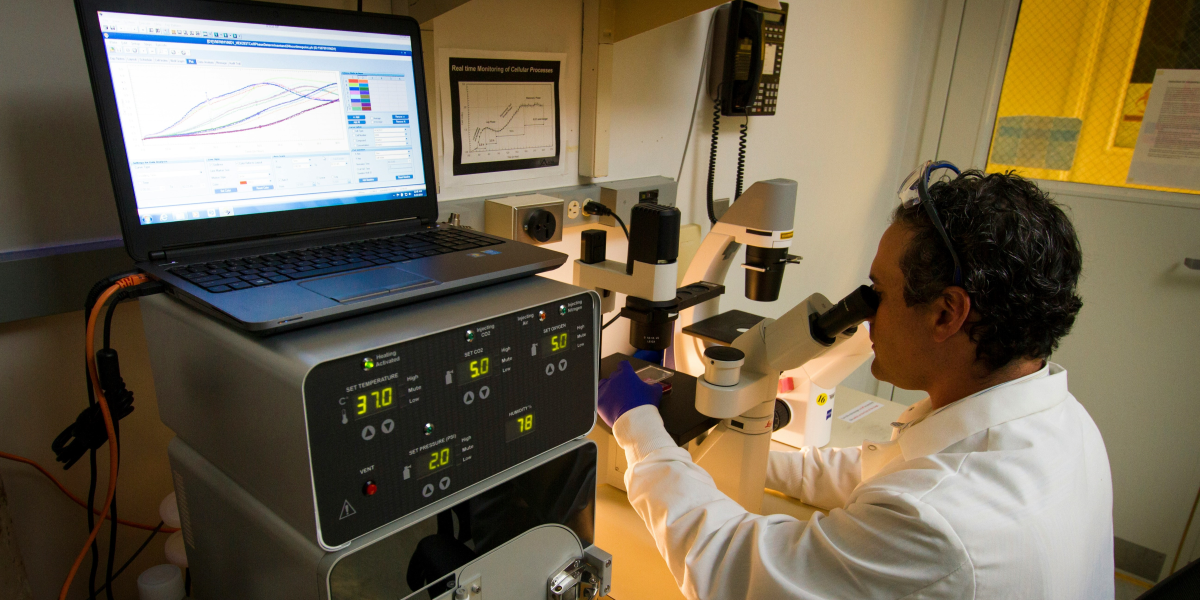Artificial Intelligence (AI) is reshaping many industries, with genetics being a field experiencing rapid transformation. AI’s unparalleled capacity to process and interpret vast datasets has made it a vital tool in decoding complex DNA sequences. This fusion of technology and genetics opens new possibilities for understanding diseases, creating targeted therapies, and advancing personalized medicine.
Understanding DNA’s Critical Role
What is DNA?
Deoxyribonucleic Acid, or DNA, is the fundamental blueprint for all living organisms. This molecule encodes the genetic instructions for growth, development, and reproduction. Structurally, DNA comprises two intertwined strands, forming a double helix. It consists of four nucleotide bases—adenine (A), thymine (T), cytosine (C), and guanine (G)—whose precise sequences dictate an organism’s genetic makeup. These sequences are integral to defining traits, influencing health outcomes, and providing the basis for genetic inheritance.
DNA’s Genetic Influence
The sequences within DNA shape an organism’s traits and can predispose individuals to genetic disorders. Decoding DNA is crucial for detecting hereditary conditions, developing targeted medical therapies, and enhancing capabilities in genetic engineering. Gaining more profound insights into DNA’s structure and functions allows scientists to better understand disease mechanisms, paving the way for more effective treatments and preventive measures.
AI’s Role in Decoding DNA
Efficient DNA Analysis
AI excels at analyzing DNA sequences with speed and precision beyond the reach of traditional methods. Machine learning algorithms are particularly adept at identifying complex patterns and detecting anomalies within genetic data. This capability is transformative for diagnosing genetic disorders, uncovering hereditary traits, and furthering evolutionary studies. The vast data involved in genetic research, which would take humans years to process, can be interpreted by AI in a fraction of the time, leading to more rapid breakthroughs.
AI Techniques in Genetic Decoding
AI relies on a range of models and techniques to decode DNA effectively:
- Deep Learning: Advanced neural networks trained on extensive genetic datasets can accurately predict DNA functions and detect disease-related mutations.
- Natural Language Processing (NLP): By treating DNA as a “language” composed of sequences and patterns, NLP techniques enable AI systems to decode complex genetic interactions and structures.
- Reinforcement Learning: This approach helps AI systems refine their predictive accuracy through continuous feedback, optimizing the processes of gene sequencing and mutation detection.
Noteworthy AI Tools
Several AI-powered tools have become integral to genetic research:
- GROVER: Developed by BIOTEC, GROVER is a sophisticated AI model that decodes genetic material’s structural and functional properties, offering new insights into DNA’s intricate “language.”
- DeepVariant: An open-source tool from Google, DeepVariant leverages deep learning to accurately identify genetic variants from sequencing data, providing valuable mutation detection capabilities.
Transformative Benefits of AI in Genetics
Accelerated Research
AI’s capacity to rapidly process large-scale genetic data has accelerated the pace of research. This speed leads to faster discoveries, streamlines medical treatment development, and expedites the delivery of solutions to complex genetic problems.
Enhanced Precision
AI minimizes human error by identifying subtle genetic patterns and variations with unmatched accuracy. This precision allows for a deeper understanding of genetic interactions and more accurate diagnoses, ultimately leading to better health outcomes.
Personalized Medicine
One of the most promising applications of AI in genetics is the advancement of personalized medicine. By decoding individual DNA sequences, AI can facilitate the creation of tailored treatment plans that align with a patient’s genetic profile, improving treatment efficacy and reducing the risk of adverse reactions.
Overcoming Challenges and Ethical Considerations
Data Privacy and Security
The use of AI in genetic research raises critical data privacy concerns. Genetic information is highly sensitive, and robust protocols are essential to prevent unauthorized access, data breaches, and misuse. Ensuring the security of genetic data must be a top priority in the continued integration of AI in this field.
Ethical Implications
AI-driven genetic decoding also raises ethical questions, such as the potential for genetic discrimination, the implications of genetic modifications, and broader societal concerns regarding genetic privacy and equitable access to these technologies.
Technical Complexities
Developing and deploying AI systems to decode DNA involves substantial technical challenges. These include the need for comprehensive datasets, managing the inherent complexity of genetic material, and accessing the computational resources necessary to analyze such vast amounts of data efficiently.
Future Directions and Integration
Convergence with Emerging Technologies
The integration of AI with other technological innovations like CRISPR (Clustered Regularly Interspaced Short Palindromic Repeats) holds transformative potential. This convergence could revolutionize gene editing, offering the possibility of treating or even curing previously considered untreatable genetic disorders.
Ongoing Research and Collaboration
The continued advancement of AI in genetics depends on sustained research, interdisciplinary collaboration, and iterative refinement of algorithms. By fostering partnerships across scientific disciplines and investing in AI development, the potential for groundbreaking genetic discoveries remains immense.
Final Thoughts
AI-powered DNA decoding transforms genetic research, offering unprecedented opportunities for disease diagnosis, personalized treatments, and deeper insights into our genetic makeup. While challenges related to privacy, ethics, and technical complexity remain, the integration of AI in genetics holds vast promise for shaping the future of medicine and unlocking the full potential of human health. As research progresses and ethical frameworks evolve, AI-driven genetic decoding will continue to redefine what is possible in medical science.
Published by: Annie P.















